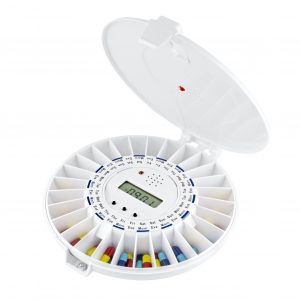Medication can be used to manage dementia symptoms but there is sadly no cure for the disease. Here’s a quick guide to medication currently being used.
If your loved one has recently been diagnosed with a form of dementia and they have been prescribed medication, you may be wondering how it helps and what the drugs do. Here are some key things to know about medication for dementia…
There are no specific dementia drugs available
There are drugs to treat Alzheimer’s disease, but not other forms of dementia such as vascular dementia. However, a person with another form of dementia may be given other drugs to treat underlying conditions, such as heart disease, high blood pressure or a stroke in the case of vascular dementia. Drugs may also be used to treat symptoms, such as hallucinations suffered by a person who has Dementia with Lewy bodies. Specialist drugs are only available for people with Alzheimer’s disease.
What Alzheimer’s drugs do
Medication for Alzheimer’s disease may help to manage the symptoms, but it won’t slow down the progression of the disease. The condition will still progress, and medication is simply masking the symptoms – like taking a tablet when you have a headache.
Different types of dementia medication
There are several types of medication for Alzheimer’s disease. They include cholinesterase inhibitors which work by boosting levels of a chemical messenger called acetylcholine (ACH) inside the body. This is thought to improve communication between nerve cells. The current medication used to treat Alzheimer’s disease include: Donepezil (Aricept), Rivastigmine (Exelon), Galantamine (Reminyl) and Memantine (Ebixa or Axura).
About medication side-effects
Medication for Alzheimer’s disease may help to reduce depression, aggression and anxiety, although the drugs will only work for some people. Side effects can include vomiting and diarrhoea.
Memantime for Alzheimer’s
Memantime is usually prescribed for those with severe Alzheimer’s disease, or those with moderate Alzheimer’s if cholinesterase inhibitors aren’t suitable. It works by regulating activity of Glutamate, a chemical messenger involved in brain functions that is released excessively when brain cells are damaged. Side effects of Memantime can include dizziness, aggression, depression, headaches and sleepiness.
Prompting the person to take medication
Your loved one will probably need prompting to take their medication as they may forget. I used to call my mum and get her to take her tablets while I waited on the phone. She used a dosset box marked with different days of the week. However, a product with a timer or alarm to prompt her would have been more useful and given her more independence. TabTime, suppliers of medication management products, has a range of safe pill dispensers ideal for a person with dementia that can prompt someone to take their medication. Visit TabTime for more information.

Get the person’s medication reviewed regularly
Make sure your loved one sees their GP to have their medication reviewed at least twice a year. They may need to change the dosage or switch to a different medication as the condition progresses. This is especially important if the person has vascular dementia which is linked to high blood pressure. It’s important for the person to have their blood pressure checked and undergo a general health check.
